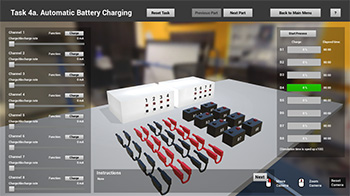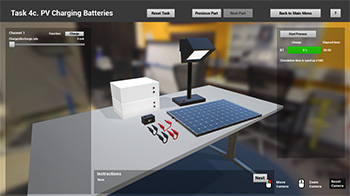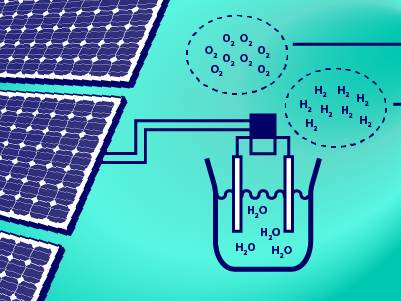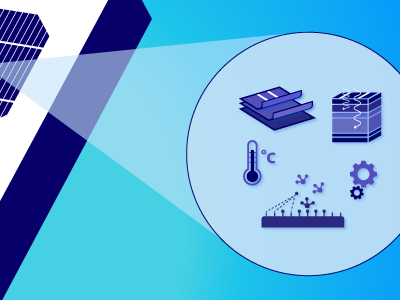Overview
Note: This course can be started at any time until 10 December 2023, and it will be closed for all participants on 20 December 2023. Please note that all assignments should be submitted before the end date in order to obtain the certificate.
Learn about the characteristics and operation of photovoltaic systems and their critical components.
This course provides you with practical experience on PV systems and their building blocks, including batteries and power electronics. If you normally just know the theory behind battery performance, inverters, the efficiency losses due to different system components; or the impact of module tilt, orientation and weather conditions on modules performance, in this course you will see − in real time – how they impact the operation of photovoltaic systems and their components in realistic scenarios.
You will gain this practical experience in a virtual lab environment in which you will conduct experiments. This course includes 3 parts focusing on electronic components and a system design:
Part 1 – Rechargeable batteries
You will experiment with applying rechargeable battery technology to photovoltaic systems and learn which parameters affect battery performance. You will also understand difference between Li-ion and lead-acid batteries.
Part 2 – Power Electronics
You will measure the operational characteristics of charge controllers, grid-connected and stand-alone inverters (off- and on-grid), and maximum power-point trackers.
Part 3 - Photovoltaic systems
You will design and analyze the performance of a complete photovoltaic system. Specifically you will analyze the effect of module tilt and orientation; investigate the losses; study the operation of a grid-connected system and determine its efficiency; and evaluate the effect of rain and shade on the system power output.
(read more about each part in the "details" tab)


This course is part of the Virtual Lab: Photovoltaic Conversion, Systems and Components program. This program offers PV professionals the opportunity to enrich their understanding of PV theory and best practices through practical work. It also suits engineers new to the industry who seek a more "hands on" experience with solar equipment, and so gain a more pragmatic understanding of their work.
Package price - the full professional certificate program consisting of two courses (Virtual Photovoltaic Laboratory): € 650 (saving € 140). Read more.
About the PVMD group at TU Delft
The Photovoltaic Materials and Devices (PVMD) group has more than twenty years' experience in the field of PV device characterization and modelling. The group has earned its academic reputation through the significant number of publications on the topic, authored by all the instructors of this online course. The group has been in direct contact with leading firms in the solar energy sector all over the world and continuously contributes to further advancement in the field. Specifically, the group contributes to the optimization of thin-film and wafer-based silicon solar cells, the development of novel concepts using nano-structured materials for future high-efficient solar cells, the demonstration of smart modules and PV-power multi-functional building elements, and the energy yield modelling of X-Integrated PV systems.
What You'll Learn:
After following this course, you will be able to:
- Apply common rechargeable battery technology within photovoltaic systems and understand their key parameters;
- Measure the operational characteristics of charge controllers, grid-connected and stand-alone inverters, and maximum power-point trackers;
- Design entire photovoltaic systems based on the factors that determine their performance.
Details
Course Syllabus:
Part 1: Rechargeable batteries
Apply common rechargeable battery technology to photovoltaic systems and understand their key parameters.
In the first two weeks of the course, you will learn the different characteristics of common rechargeable batteries. You will:
- Understand the main differences between Li-ion and lead-acid batteries;
- Determine which charging/discharging parameters affect the battery performance most.
Part 2: Power electronics
Measure the operational characteristics of charge controllers, grid-connected and stand-alone inverters, and maximum power-point trackers.
In the middle two weeks of the course, you will explore the power electronic components commonly used in photovoltaic systems. In fact, you will:
- Manually mimic the operation of maximum power point trackers to understand their basic working principles;
- Examine and compare the operation of two different charge controllers;
- Analyze and compare the performance of off-grid (stand-alone) and on-grid inverters.
Part 3: Photovoltaic systems
Design entire photovoltaic systems based on the factors that determine their performance.
In the last two weeks of the course, you will design and analyze the performance of a complete photovoltaic system. You will:
- Analyze the effect of module tilt and orientation;
- Study the operation of a stand-alone system and determine its efficiency;
- Investigate the losses occurring in a photovoltaic system;
- Study the operation of a grid-connected system and determine its efficiency;
- Evaluate the effect of rain and shade on the system power output.
Qualifications
Certificates
If you successfully complete this course you will earn a professional education certificate and you are eligible to receive 3.0 Continuing Education Units (CEUs).
Admission
This course is primarily geared towards working professionals.
Prerequisites
To successfully complete this course, learners must know the basic operation principles of photovoltaic systems and of all their components. If you seek a refresher course that will help you prepare for this course, you may want to review the content of the free online course offered by TU Delft:
Contact
If you have any questions about this course or the TU Delft online learning environment, please visit our Help & Support page.




